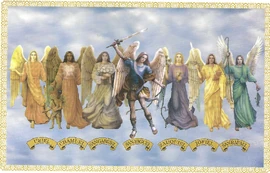
The earliest reference to a system of seven archangels as a group appears to be in Enoch I (the Book of Enoch) which is not part of the Jewish Canon but is prevalent in the Judaic tradition, where they are named as Michael (Sunday), Gabriel (Monday), Raphael (Tuesday), Uriel (Wednesday), Raguel (Thursday), Ramiel (Friday; he is described in the Book of Enoch as having fallen from grace, possibly replaced by Phanuel (angel), who is the fourth Archangel) and Sariel (Saturday). While this book today is non-canonical in most Christian churches, it was explicitly quoted in the New Testament (Letter of Jude 1:14-15) and by many of the early Church Fathers. The Ethiopian Orthodox Church to this day regards it to be canonical.
In the late 5th to early 6th century, Pseudo-Dionysius gives them as Michael, Gabriel, Raphael, Uriel, Camael, Jophiel and Zadkiel.
The earliest Christian mention is by Pope Saint Gregory I who lists them as Gabriel, Michael, Raphael, Uriel (or Anael), Simiel, Oriphiel and Raguel. A later reference to seven archangels appeared in an 8th or 9th century talisman attributed to Auriolus, a "servant of God" in north-western Spain. He issues a prayer to "all you patriarchs Michael, Gabriel, Cecitiel, Oriel, Raphael, Ananiel, Marmoniel ("who hold the clouds in your hands").
Archangels in current church traditions[]
In the Catholic Church three Archangels are mentioned by name in its canon of Scripture: Michael, Gabriel, and Raphael who appears in the deuterocanonical Book of Tobit, where he is described as "one of the seven angels who stand ready and enter before the glory of the Lord of Spirits", a phrase recalled in Revelation 8:2-6.
Some strands of the Eastern Orthodox Church, exemplified in the Orthodox Slavonic Bible (Ostrog Bible, Elizabeth Bible, and later consequently Russian Synodal Bible), recognize as authoritative also 2 Esdras, which mentions Uriel. The Eastern Orthodox Church and Eastern Catholic Churches of the Byzantine tradition, venerate seven archangels and sometimes an eighth. Michael, Gabriel, Raphael, Phanuel, Selaphiel (Salathiel), Jegudiel (Jehudiel), Barachiel, and the eighth, Jerahmeel (Jeremiel) (The Synaxis of the Chief of the Heavenly Hosts, Archangel Michael and the Other Heavenly Bodiless Powers: Feast Day: November 8).
As well as Uriel, the Book of Enoch, not regarded as canonical by any of these Christian churches, mentions (chapter 21) Raguel, Sariel, and Jerahmeel, while other apocryphal sources give instead the names Izidkiel, Hanael, and Kepharel.
In the Coptic Orthodox tradition the seven archangels are named as Michael, Gabriel, Raphael, Suriel, Sedakiel, Sarathiel, and Ananiel.
In Anglican and Episcopal tradition, there are three or four archangels in the calendar for September 29, the feast of St Michael and All Angels (also called Michaelmas), namely Gabriel, Michael, and Raphael, and often also Uriel.
Other ideas[]
Although in the Book of Enoch, Ramiel is described as one of the leaders of the 200 Grigori, the fallen angels, the leader is identified as Semjaza and the name is spelt differently and therefore this is a different angel. Other names derived from pseudepigrapha and recognized by Eastern Orthodox and Oriental Orthodox churches are Selaphiel, Jegudiel, and Raguel.
Seven angels or archangels are given as related to the seven days of the week: Michael (Sunday), Gabriel (Monday), Raphael (Tuesday), Uriel (Wednesday), Selaphiel (Thursday), Raguel or Jegudiel (Friday), and Barachiel (Saturday).
Various occult systems associate each archangel with one of the traditional "seven luminaries" (the seven naked-eye moving objects in the heavens: the Seven Classical Planets): the Moon, Mercury, Venus, the Sun, Mars, Jupiter, and Saturn; but there is disagreement as to which archangel corresponds to which body.
According to Rudolf Steiner, four important archangels also display periodic spiritual activity over the seasons: Spring is Raphael, Summer is Uriel, Autumn is Michael, and Winter is Gabriel. Following this line of reasoning, Aries (astrologically ruled by Mars) represents Spring, Cancer (ruled by Moon) represents Summer, Libra (ruled by Venus) represents Autumn, and Capricorn (ruled by Saturn) represents Winter. Therefore, by association, Raphael is Mars, Uriel is Moon, Michael is Venus, and Gabriel is Saturn. Rudolf Steiner's Northern Hemisphere indications regarding the seasons and their placement in the Zodiac will be the opposite in the Southern Hemisphere, making Michael the Autumn archangel – with Mars in Aries; Raphael the Spring Archangel – with Venus in Libra; and in mid-winter Gabriel in Cancer; Uriel presides in Capricorn during mid summer in the south.
The seven archangels figure in some systems of ritual magic, each archangel bearing a specific seal.